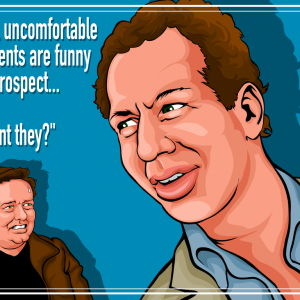01.09
Rowsdowr
Cult Film, TV, Geek Art
From his GQ interview, The Comedian’s Comedian’s Comedian:
In 2006 the UK’s Channel 4 aired a special called Ricky Gervais Meets…Garry Shandling that became an instant sensation among connoisseurs of comedy. The premise, which Gervais had already tried out with Larry David a year earlier, was for the British comedian to pay a visit to one of his heroes. They’d talk about the craft of being funny. Hilarity would ensue.
From the moment the two men meet, in Shandling’s kitchen, it’s clear something is wrong. Shandling seems put out—irritated, even. “Don’t touch me,” he says when Gervais puts a hand on his shoulder. Gervais appears nervous, confused by Shandling’s disapproval. As Shandling puts his contacts in over the sink, Gervais scolds him for putting the lenses at risk, and Shandling looks so peeved you think he may call the whole thing off. “What are you, controlling?” he asks. “You’re giving me advice on how to put my contact lenses in?” When a distant buzzer sounds, Shandling says it’s his “ass detector, and it’s gone off because you’re here.” Gervais tries to get Shandling to follow him outside. Shandling won’t go, turning instead to the camera to comment on Gervais’s obliviousness. Gervais responds by emitting his loud, high-pitched squeal of a laugh. He’s on the ropes, and he’s not quite sure how he got there. And that’s just the first five minutes. Only later will Shandling ask Gervais why he makes fun of people with cerebral palsy. Only later will Shandling say, pointedly, “I’m starting to get the feeling that you’re not comfortable around Jewish people,” or ask, “Does that make you feel better about yourself, to attack me?”
In certain circles, the Shandling-Gervais smackdown has risen to the level of an unsolved mystery. People who know Shandling get asked all the time: What was going on, exactly, that led to the most awkward forty-seven minutes in the history of television? Neither man has ever explained it, not in public and not to each other. But when I ask Garry to do so, he looks relieved, as if an anvil has been lifted off the top of his head.
“Oh, good,” he says, and begins to talk.
While completing the DVD extras for Sanders, Shandling had been struck by the idea that Gervais would be a great addition. Though he’d never appeared on the show, Gervais had spoken openly about how Sanders inspired him. So Garry called Gervais and asked if he’d do it. The answer was yes, but Gervais also had a request. While he was in Garry’s home, could they also shoot his Channel 4 show? Shandling agreed, and all was well until the day of the dueling interviews, when wires got crossed. Garry says he assumed they would shoot the “visit” for the DVD extra first, because “that laid-back, not-on tone is good preparation for saying, ‘Let’s turn it on'” later, for Gervais’s special.
But when Shandling walked into his kitchen, he realized instantly that Gervais thought the Channel 4 special was being shot first. Gervais was on—extremely so—and so were several cameras. Garry could have said something but wanted to see what would happen if he played it out. What if he stayed in the same low-affect head space he was in to do his DVD extras? Could he reach Gervais without explicitly identifying the problem? Could he bring Gervais’s energy level down?
“It’s fascinating, really,” Garry tells me. “We both became locked into the shows we were each doing, and it became a bit of a boxing match. Because he’s trying to get me to do the show that he needs, and I’m trying to get him to do nothing. I was trying to pull Ricky into the moment.”
A great boxer makes his opponent fight his fight, on his terms. A great stand-up takes control of a room. There’s a reason comics say their best shows “killed.” Making people laugh is, at its simplest, an act of domination. And Shandling dominated Gervais. I tell Garry their interaction looks more hostile than he will admit. He offers me an organic-turkey sandwich. “A lot of funny people have a way of looking at life and commenting on it,” he says. “Now, there’s another leap to take, which is: Are those funny people actually integrating their life into their work? I still search for ways to put it. It’s living art. I see it as living life as an art. And part of that’s the comedy, and part of that’s the acting, and part of that’s the basketball, and part of that’s the boxing.”
Here are highlights from Ricky Gervais Meets… Garry Shandling




















